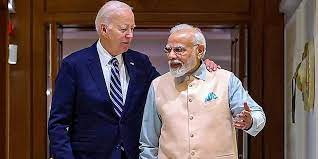WASHINGTON, Nov 28: The Biden administration, because of the significance it attaches to its ties with New Delhi, “bent backwards” to be very polite in its public responses following the Canadian allegations against India over the killing of one of its citizens, a top American expert on India-US relations has said.
“I think the US response was actually quite remarkable because Canada is a very close ally, and if it was any other country than India, I think the US response would’ve been much more vocal and much more strident,” Ashley J Tellis, the Tata Chair for Strategic Affairs and a senior fellow at the prestigious Carnegie Endowment for International Peace told PTI in an interview.
Tellis was responding to a question on the criticism in India about the US response to the Canadian allegations that they were investigating allegations that the Indian government was involved in the killing of Khalistani separatist Hardeep Singh Nijjar in Canada.
India has dismissed the allegations as “absurd” and “motivated” and has told Canada to provide it with any evidence that it might have.
The Biden administration has expressed concern over the allegations and urged India to cooperate with Canadian authorities in this investigation.
“I think this administration bent backwards to be very, very polite in its public response, encouraging India to obviously join the Canadian investigation, but without uttering any words of direct condemnation. And I think that is quite remarkable for the administration. I think people should recognise how different the administration’s response was, both in its tonality and in its substance,” Tellis said in response to a question.
Tellis, who is considered to be the most respectable and foremost American expert on Indian issues, said that the three years of the Biden administration have been fantastic for the India-US relationship.
“It has been fantastic. When I look back, it is hard to imagine that any administration, particularly after Trump, would have put so much investment into this relationship with New Delhi. It is really to President (Joe) Biden’s credit that he has taken responsibility for this relationship. You can see that very clearly in the way that he treated the Prime Minister (Narendra Modi) when he came on the State Visit and all the initiatives that have occurred since,” he said.
“The big question now is whether the president will be able to go to India for Republic Day and for the QUAD meeting. Next year, my suspicion is even if the president goes, which would be wonderful if he can pull that off, I think will be a year that consumes both governments in different ways because of the election,” he said.
“So, the tempo of the relationship will obviously proceed as it has been in the last several years. But I do not think both sides will have the capacity for big initiatives because President Biden is going to be completely consumed by an election process that lasts almost the entire year all the way to November of next year. And Prime Minister Modi will be up for election sometime in the first half of the next calendar year,” he said.
“So, I think expecting big initiatives might be tough, but there is so much on the plate already that we don’t need big initiatives. We need some time to just enjoy what we have eaten, and the digestion has to work its way through,” Tellis said.
The overall picture of the relationship, he said, is very good. “There is a remarkable commitment on the part of the leadership on both sides to take the relationship forward. Both Prime Minister Modi and President Biden have put very impressive chips on the table with respect to where they want to go,” he said.
“The strategic dimension of the relationship is well understood, but the technology dimension, the educational dimension, the issues relating to things that previously we did not pay too much attention to. Everything from agriculture to science and technology, everything now is on the table as an aspect of cooperation,” he said.
“In the context of the competition with China, the US competition with China, the effort that the administration is making to diversify the production base, particularly for manufacturing, is really very impressive. India features very highly in that plan because it is seen as a trusted partner. So, I think the future of the relationship is extremely bright. We will always have problems that have to be managed along the way, but as long as both sides keep their eye on the ball and focus on what the long-term opportunities are, I think we’ll be in a very good place,” Tellis said.
China, he said, is a very important factor in the India-US relationship.
“And we should not pretend that it’s not because it adds a dose of realism when we talk about the relationship. China has of course brought this situation about. I mean I think the US-India relationship was moving in the right direction even before China was seen as a strategic competitor.,” he said.
“But China certainly accelerated that process because it has threatened India and pushed India in a sense almost into US arms. And it has threatened US interests in the Indo-Pacific. That has pushed the United States even closer to India because it sees India as a very important part of that global strategy of coping with China’s rise,” Tellis said. (PTI)


